Many veterinarians say that getting to the bottom of an animal health challenge often involves deducing a series of clues.
To help beef producers solve the mystery of why their cattle conception rates aren’t where they’d hoped, Kansas State University has launched the Heifer CONSULT resource.
“Heifer CONSULT is designed to help beef cow-calf producers improve the reproductive success of their heifers and young cows,” said Bob Larson, K-State veterinarian and the principle investigator on the USDA grant that funded the project.
The free tool is available on the Beef Cattle Institute website at www.ksubci.org under the ‘Tools’ header.
“As producers work through this program, they are asked several questions about the reproductive status of the herd as well as management practices,” Larson said.
Ideally, Larson added, producers will use records from a pregnancy check done by a veterinarian shortly after the breeding season, but calving data can also be used.
“Throughout Heifer CONSULT, producers will be provided links to additional information to help answer questions and the list of references for the information supplied,” Larson said.
The tool is focused around heifer development from weaning at about seven months of age to the time she conceives her second calf at about 26 months old.
Larson said Heifer CONSULT was developed through a collaborative effort of veterinarians and beef cattle extension specialists from across the Midwest. Along with Larson, other K-State faculty on the development team included veterinarian Brad White, and beef extension specialist Sandy Johnson.
Others included Bob Cushman, USDA Meat Animal Research Center; Rick Funston, University of Nebraska; Dale Grotelueschen, University of Nebraska-GPVEC; Scott Lake, University of Wyoming; Dave Smith, Mississippi State University; and Sherri Merrill, a veterinary practitioner from Allen, Kansas.
“This tool was built by the top experts in heifer development,” Larson said. “Through it we hoped to replicate the type of discussion a producer might have with an expert face-to-face.”
The hope is that producers will use this tool in consultation with their veterinarian.
Larson said: “By carefully selecting, managing and monitoring heifers from weaning to becoming pregnant with their second calf, producers can optimize reproduction and economic efficiency.”


